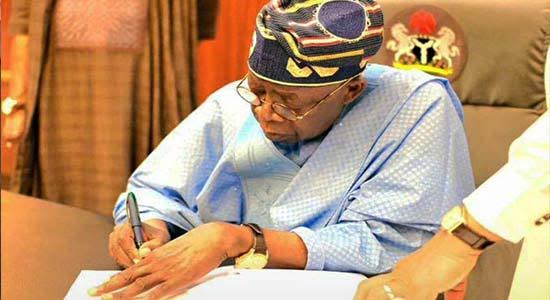“We have just signed the bill enacting the student loan, making it effective.
First and foremost, I extend my gratitude to the members of the National Assembly for their swift handling of this bill, recognizing that education is the key tool in effectively combating poverty for Nigeria’s youth.
We are committed to ensuring that education receives the attention it deserves in our country, including the implementation of skill-development programs.Our aim is to guarantee that no one, regardless of their socioeconomic background, is deprived of access to quality education and the opportunity to shape their own future.
We are gathered here because education has benefitted us all. In the past, we witnessed far too many of our children dropping out of school and missing out on opportunities.”
President Bola Ahmed Tinubu has signed the Student Loans Re-enactment Bill, heralding a new era for higher education financing in Nigeria. The bill repeals the Students Loans (Access to Higher Education) Act of 2023 and introduces the Student Loans (Access to Higher Education) Bill of 2004, establishing the Nigerian Education Loan Fund (NELF). This entity is entrusted with managing and investing funds to provide loans for higher education, vocational training, and skills acquisition.
The signing of this bill at the State House, witnessed by the National Assembly’s leadership, ministers, and key education stakeholders, marks a significant milestone in Nigeria’s commitment to empowering its youth through education. The Nigerian Education Loan Fund is poised to become a pivotal institution in supporting students’ aspirations for higher education.
– Establishment of NELF: The bill creates a corporate body responsible for receiving, managing, and investing funds specifically for educational loans.
– Funding Sources: NELF will draw from various funding streams, including a percentage of federal government profits from oil and other minerals, taxes, levies, and duties from the Federal Inland Revenue Service (FIRS), Nigeria Immigration Service (NIS), and Nigerian Customs Service (NCS).
– Loan Accessibility: The fund aims to provide equitable access to loans for all Nigerian students seeking higher education, without discrimination based on gender, religion, tribe, position, or disability.
– Repayment Terms: Students can repay their loans in installments starting two years after completing their National Youth Service Corps (NYSC) program, making the terms favorable for graduates entering the workforce.
The enactment of this bill is expected to have far reaching implications for Nigeria’s educational landscape. By removing financial barriers to higher education, NELF could significantly increase the number of skilled professionals contributing to the nation’s development. Moreover, the focus on vocational training and skills acquisition aligns with global trends emphasizing the importance of practical skills in the job market.
President Tinubu’s administration has taken a decisive step towards enhancing the accessibility and affordability of higher education in Nigeria. The Student Loans Re-enactment Bill reflects a strategic approach to developing human capital and equipping the Nigerian youth for the challenges of the modern economy. As the Nigerian Education Loan Fund begins its operations, it carries the hopes of a generation eager to build a brighter future for themselves and their country

